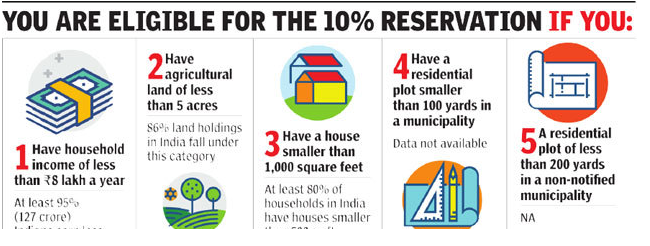EWS Quota
Figure 2: No Copyright Infringement Intended
Context:
- Recently ,the government has accepted the report of a three-member panel constituted to revisit the Economical Weaker Section (EWS) criteria which was set up after the instruction of supreme court.
Panel observations:
On the Income Ceiling:
- The committee described the Rs 8 lakh gross family annual income cap as 'reasonable and equitable in the current circumstances,' because, unlike the OBC creamy layer reservation, the EWS system incorporates income from all sources, including agricultural income and household salaries.
- The income criterion for the creamy layer in the Other Backward Classes (OBC) category applies to gross yearly income for three consecutive years, whereas the EWS criteria apply to the financial year before to the year of application.
- Despite the fact that both sets of criteria use the Rs 8 lakh cut-off, the committee came to the conclusion that the EWS standards are much more strict than the OBC creamy requirements.
On the Residential criteria:
- The group has proposed that the residential asset criteria be eliminated entirely, stating that simple possession of a residential residence may not accurately reflect the candidate's or his family's economic situation, especially if it is simply utilised as a living unit and does not generate any income.
Other Recommendations:
- It is recommended that the recommendations be implemented only from the next admission cycle forward, rather than from the current one, because any abrupt change will cause substantial disruptions among educational institutions and produce issues for both recipients and authorities.
- It has been proposed that the present admissions method, which has been in place since 2019, be maintained for the current admission
- 'A three-year feedback loop cycle may be utilised to monitor the actual outcomes of these criteria and then be used to change them in the future,' the panel adds.
- It's also been suggested that data interchange and information technology be aggressively employed to check income and assets and improve EWS reservation targeting.
About EWS Quota:
- The Constitution (103rd Amendment) Act provides for 10% reservation in government jobs and
- educational institutions for the economically weaker section in the unreserved category.
- The Act amends Article 15 and 16 to provide for reservation based on economic backwardness.

More about EWS quota:
- It is in addition to 50% reservation already provided to SC, ST and OBC communities.
- Declaration of EWS is based on fulfilling of following criteria:
- Income should be less than 8 Lakh per annum.
- One should not have more than 5 acre farm land.
- Home size should be less than 1000 sq. feet.
Positives of EWS reservation:
- It provides legitimacy to already existing reservation. Now, universities won’t be segregated between merit candidates and reserved communities.
- It is secular in nature and includes all religions: Muslims, Christians
- Economic justice is the philosophy behind it. In an increasing economic society, class becomes a tool of oppression.
- It address contemporary reservation movements like Jats reservation, Patel reservation.
- 8 Lakh is creamy layer identified in OBC reservation. Hence, 8 Lakh is justified as a basis of class criteria.
Concerns/drawbacks of EWS reservation:
- It violates Indira Swahney judgement of Supreme court which applied 50% cap on the reservation.
- Social justice has been the philosophy behind reservation. Upper caste are at the top of caste pyramid and doesn’t require any reservation.
- It is not based on any scientific data. A survey of 450 educational institutions had found 28% students belonging to EWS section.
- The criteria qualifies around 90-95% population.
- The reservation doesn’t make any sense when jobs are on the rise in private sector. Public sector is already declining and not creating many jobs.
- This reservation move can be abused by changing the economic status by selling property or showing lower income.
Conclusion:
- Administration must ensure that non-deserving population doesn’t get the EWS certificate.
- Genuine poor and needy section should get the opportunity.




1.png)
